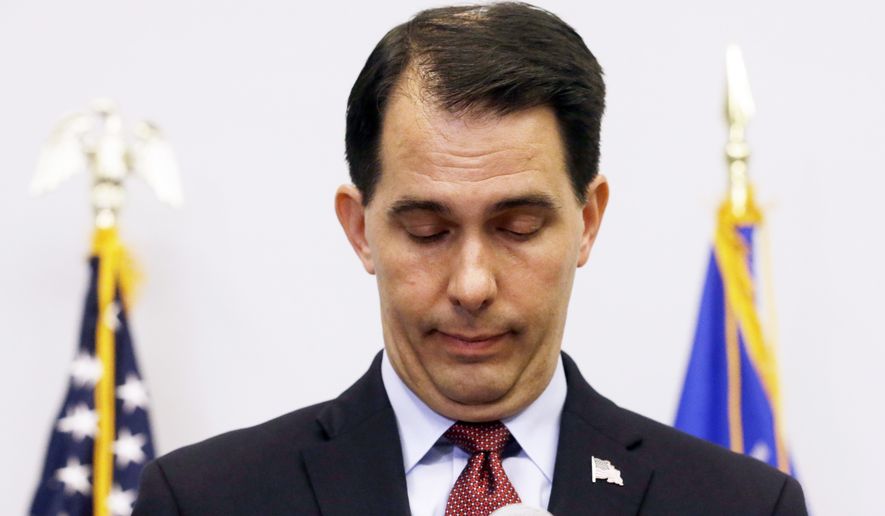His nascent presidential bid struggling to capture popularity and fresh dollars, Gov. Scott Walker made the hard decision last month to fork over $40,000 from his shrinking campaign coffers to the South Carolina GOP to ensure he would have a spot on that state’s crucial primary.
The fateful decision proved a fitting symbol for a steep price of admission that Mr. Walker ultimately could not afford. He won’t compete in South Carolina next February after stunning the political world by suspending his campaign Monday.
Political strategists say the price of staying in the crowded 2016 race may further shrink a GOP field that just a few weeks ago topped 17 candidates and had prognosticators predicting most contenders could last into spring with the help of outside super PACs.
The fact that Mr. Walker and former Texas Gov. Rick Perry — two politicians with large super PAC support — were the first two candidates to drop out has most rethinking that conventional wisdom.
“Super PACs, it was said, will give all candidates a way to stay in longer than their results would usually allow. Well, the man with some of the best super PAC numbers just exited with brimming super PAC coffers,” said American Conservative Union Chairman Matt Schlapp, a former George W. Bush adviser.
The simple reason is there are many expenses that super PACs legally can’t pay, like ballot access fees. And if the official campaign committee can’t raise big bucks, a candidacy may simply sputter.
PHOTOS: Best states for concealed carry — ranked worst to first
When Mr. Perry dropped from the race earlier this month, his team cited, among other things, the expense of competing in South Carolina, where $20,000 must be paid to the State Election Commission and another $20,000 to the state GOP just to get on the ballot.
No political pro claims to have the exact order of the next withdrawals, although names like Louisiana Gov. Bobby Jindal, former New York Gov. George Pataki, Sen. Lindsey Graham of South Carolina, former Sen. Rick Santorum of Pennsylvania, former Virginia Gov. Jim Gilmore and former Arkansas Gov. Mike Huckabee come up.
The varied reasons include low poll numbers, fundraising challenges or their status as government insiders in a race that now seems tilted toward political novices.
“The next out I suspect will be Pataki, Graham, Jindal, Santorum and Huckabee,” said Iowa state Rep. Stewart Iverson, a former state GOP chairman.
New Jersey Gov. Chris Christie, Ohio Gov. John Kasich and Sen. Rand Paul of Kentucky are placed by many experts in political purgatory. They are doing well enough to stick around for now, but not well enough yet to rise into the top tier.
There’s a strong sense, however, that billionaire Donald Trump, neurosurgeon Ben Carson, former tech executive Carly Fiorina, former Florida Gov. Jeb Bush and Sens. Ted Cruz of Texas and Marco Rubio of Florida all have the cash and current popularity to stick around.
PHOTOS: These celebrities are devoutly Christian — and you probably didn't realize it
“I can’t tell you when they’ll drop out, but I think I know who will stick,” said Randy Brinson, an Alabama GOP campaign activist and surgeon. “Rubio, Cruz, Fiorina, Trump, Bush and Carson will remain viable. The rest may hang on for different periods of time, but not as viable candidates.”
All this goes to prove that cold hard cash — the kind that legally can be spent on campaign activists — is still an early candidate’s best friend, especially if their polling numbers haven’t started rising.
Five of the 16 candidates who competed in last week’s debate polled at 1 percent or below in CNN’s post-Reagan Library debate poll of GOP voters nationally. Most surprising among that Dismal Five was Mr. Walker.
A darling of the conservative base after his successful efforts to rein in public sector labor unions and spending in Wisconsin, Mr. Walker’s campaign was $750,000 in the red when he quit the race in a move that took the political world and much of his 90-member staff by surprise.
He already paid the South Carolina ballot access fee, but at least one other expensive state loomed on the horizon. Arkansas charges $25,000 for a campaign to gain access to its primary ballot and is the only other state with a large fee.
Only seven other states charge any fee — mostly in the $1,000 range. Still, ballot access money is but one of many cash burdens on candidates not named Bush or Trump. The others are costly advertising, travel and staff.
Mr. Paul will pay the South Carolina $40,000 fee, a senior official told The Washington Times.
Mr. Santorum said he already handed his check for $40,000 to South Carolina, but acknowledged in an interview that it was a financial burden for a campaign in which he serves as both the campaign manager and chief strategist.
• Ralph Z. Hallow can be reached at rhallow@gmail.com.




Please read our comment policy before commenting.